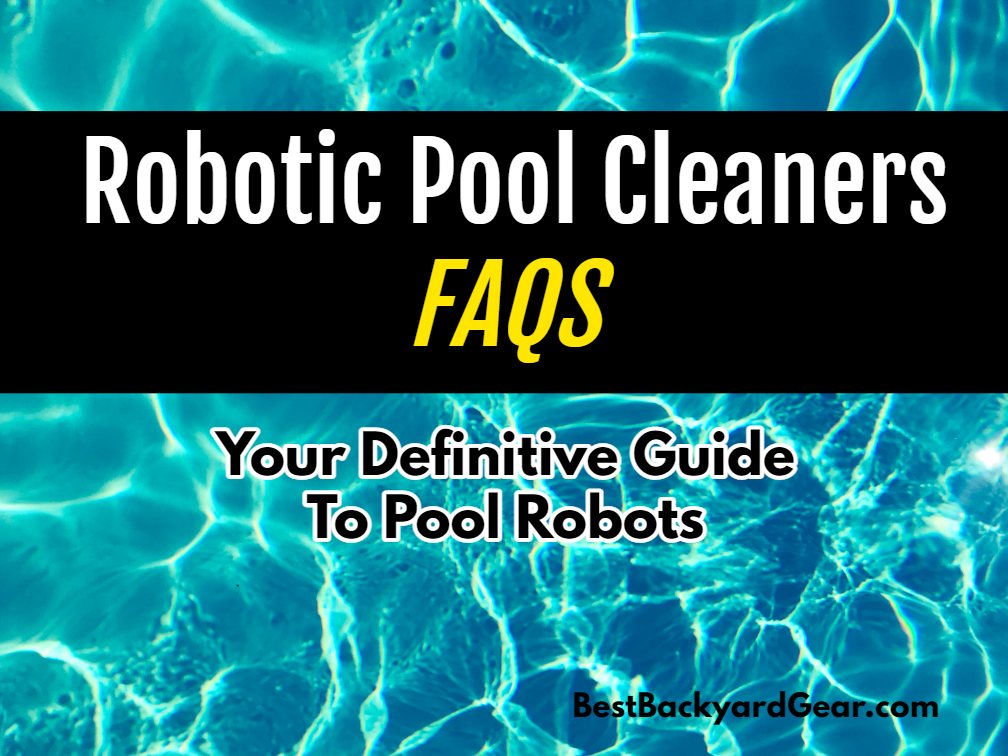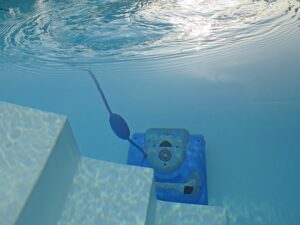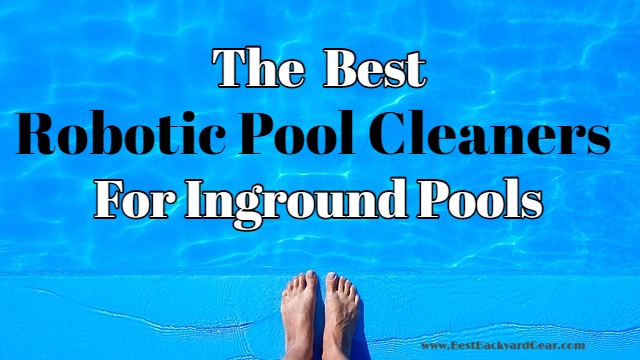Getting a robotic pool cleaner for your inground pool sounds like a great idea, doesn’t it? Less work for you, more swim time in a clean, sparkling pool.
But pool robots are machines, and somewhat complex. No doubt you have questions.
No fear, we have the answers. Together we can dive into world of robotic pool cleaners together until you’re satisfied.

Robotic Pool Cleaners For Inground Pools: FAQs
Types Of Pool Cleaners
- What are the different types of automatic pool cleaners?
- Is a robotic pool cleaner the same thing as an automatic pool cleaner?
- How do robotic pool cleaners for inground pools actually work?
- Are robotic pool cleaners ok to use in above ground pools?
Compatibility
- Do robotic pool cleaners work on any type of pool surface?
- Will robotic pool cleaners work in saltwater pools?
Cleaning Performance
- Can a pool robot save you money in the long run?
- Do robotic pool cleaners clean the waterline of the pool?
- How often should I run my robotic pool cleaner?
- Are there different sized robots? (Or robots specifically for big or small pools?)
Maintenance & Usage
- Do robotic pool cleaners plug into my pool filtration system?
- What maintenance is required for robotic pool cleaners?
- How do I store my robotic pool cleaner?
- How long do robotic pool cleaners last?
- Can I use my pool robot in a hot tub?
Purchase Considerations
Types Of Pool Cleaners - FAQS
What Are The Different Types Of Pool Cleaners?
When you start looking at buying an automatic pool cleaner, you quickly realize that there a LOT of different models, and they look rather different from each other. That’s because there are 3 types of automatic pool cleaners: Suction, Pressure, and Robotic. (Sometimes they are referred to as Suction-Side, Pressure-Side.)
Here’s an overview chart explaining the three types of Automatic Pool Cleaners:
| Suction Pool Cleaners | Pressure Pool Cleaners | Robotic Pool Cleaners | |
|---|---|---|---|
| How It Works: | Powered by suction created by the pool’s main circulation pump. Moves around the pool using wheels, scrubbing walls and floors and collecting debris into the pool’s skimmer basket. | Powered by pressure of the water returning to the pool after passing through the pool’s filtration system. Typically has its own bag for collecting debris, which means less strain on the pool’s filter system. | Self-contained unit that is plugged into a power source and lowered into the pool. Uses its own motors and pumps to move around and clean the pool. Typically has its own filtration system for collecting debris. |
| Price Range | Least expensive | More expensive than suction-side cleaners | Most expensive |
| Effectiveness | Less effective, particularly in larger or more heavily-treed pools. | More effective at removing larger debris and cleaning larger pools. | Most effective at cleaning and requires the least amount of maintenance. |
| Pool Owner Involvement | Minimal involvement – simply attach to the skimmer and let it run. | Moderate involvement – may need to adjust water pressure and empty debris bag periodically. | Minimal involvement – simply plug in and let it run. May need to empty debris bag and clean filters periodically. |
| Current Best Sellers | See On Amazon | See On Amazon | See On Amazon |
Is A Robotic Pool Cleaner The Same As An Automatic Pool Cleaner?
Nope. They are not the same. A robotic pool cleaner is just one of the three main types of automatic pool cleaners.
An automatic pool cleaner works without the need for you to manually intervene in the cleaning. All three work on their own, but suction side cleaners move in randomly pattern, while pressure side cleaners move in a pattern.
Robots move autonomously, using computer algorithms to scan and map the pool and determine the most efficient path.
Here’s a clever way of explaining it: Not all automatic pool cleaners are robotic, but all robotic pool cleaners are automatic.
How Do Robotic Pool Cleaners For Inground Pools Actually Work?
There are 2 motors in each robot. The first runs a water pump that sucks in dirt and debris through a filter. The second motor moves the robot around the pool. The entire unit is powered by a transformer that is connected to a standard wall outlet via the included cord. These robots operate on a low voltage that is specifically designed to be safe for usage under water.
Are Robotic Pool Cleaners Ok To Use In Above Ground Pools?
Robotic pool cleaners are heavy beasts, and as such, are really only good for inground pools – as opposed to above ground pools or inflatable pools or hot tubs. If you use a robot in a pool without solid walls with weight pushing against the sides, you can basically expect a ruined liner.
Compatibility FAQs
Do Robotic Pool Cleaners Work On Any Type Of Pool Surface?
Yes, from concrete to vinyl to fiberglass… and any other type of inground pool surface you can have.
Will Robotic Pool Cleaners Work In Salt Water Pools?
This is a common question in the review areas for all of the different pool cleaners I covered here, and the overall resounding answer is YES. No trouble. No rusting.
Cleaning Performance FAQs
How Effective Are Robotic Pool Cleaners At Cleaning A Dirty Pool?
Robotic pool cleaners do a fantastic job. You’ll be seriously impressed at what these babies can do.
They have some amazing tech built into them (including scanners and mapping features) that allows them to navigate the pool and make sure that they thoroughly clean the walls and floor of the pool, removing dirt, debris, and other contaminants, as well as trapping tiny particles of dust and pollen in the water.
Unlike suction-side or pressure-side pool cleaners, which rely on the pool’s filtration system to operate, robotic pool cleaners just do their own thing, complete with their own motor and filtration system. This means they can clean your pool much more thoroughly and efficiently, not relying on water pressure or how clean/dirty your filtration system is (and yes, we all forget to backwash).
Can A Pool Robot Save You Money In The Long Run?
Yes. Because cleaner water and something circulating your water regularly mean your pool’s expensive pump and filtration system will need to be used less, you’ll be saving a significant amount in energy costs (some say up to $500 annually). They are also cheaper than hiring a professional pool cleaning service, hands down.
Do Robotic Pool Cleaners Clean the Waterline of the Pool?
Most models are designed to clean the walls and floor of the pool, but unfortunately not the waterline.
However, there are some higher-end models that do come with brushes and features specifically designed to clean the waterline. If having a clean waterline is important to you, make sure to check for this feature when you’re picking out a model.
How Often Should I Run My Pool Robot?
On average, it’s a good idea to run your robotic pool cleaner once a week to keep your pool sparkling.
But remember, everyone’s pool is different!
It’ll depend on how much debris and stuff like pollen and sand end up in your pool, as well as how often you use it, the size, etc. You might find you need to run it more or less often than the average (of once a week).
Are There Different Sized Robots? (Or Robots Specifically For Big or Small Pools?)
The actual size of the robot itself isn’t really all that important. Yes, a few extra inches will theoretically speed up the time it takes to cover your pool surface, but dirt level also plays a huge factor. What’s important when it comes to the size question are 2 things:
1) Filters/filter canister size: this is where the debris collects and the bigger, the better… if it’s small, it will fill up quickly and you’ll need to interrupt the cleaning cycle to clean the filters or empty the debris.
2) Length of cord (assuming it’s a corded robot, which most are). You can’t add just an extension cord to your robot (unless you spend some serious money to buy one that can be safely submersed). Look for a robot with a cord about 10 feet longer than the longest length of your pool and you should be good.
Maintenance & Usage FAQs
How Do I Use A Robotic Pool Cleaner?
Most models are incredibly simple to use… just plug in the cord, submerge the robot, and turn it on! Here is a handy video that will help:
Do Robotic Pool Cleaners Plug Into My Pool Filtration System?
No. They run independently of your pool’s pump and filtration system. Inside each robot is a receptacle area by the filter for the debris collected during the cleaning cycle (which you need to regularly empty). Because your pool water is cleaner, your pump and filter won’t be used as often (prolonging its life).
What Maintenance Is Required for Robotic Pool Cleaners?
Like everything, if you take care of your tools, they’ll work better and longer for you.
Robotic pool cleaners do require some basic maintenance. After each use, you’ll want to clean out the filter bag or chartridge. Yup, that means you’ll have to clean out those yucky dead flies and scoop out the collected hair… yuck. If you don’t you’ll find you have clogs and less-than-optimal performance.
You’ll also want to regularly (or a few times a season) inspect the brushes and replace them when they become worn out.
How Do I Store My Robotic Pool Cleaner?
Simply store your robot in a cool, dry place when it’s not in use. Don’t store it IN THE POOL. Yes, that’s surprisingly a question people ask: “Can we keep our robotic pool cleaner in the pool all summer?” No. No you can not. Nor would you want to have that big thing moving around while you swim, I’d think!
Take it out, allow the water to drain, put into your shed on a shelf until next time.
How Long Do Robotic Pool Cleaners Last?
On average, robotic pool cleaners can last anywhere from 3 to 5 years, but it’ll depend on quite a few things: how often you use it, how well you maintain it (do you clean it out after each use), do you leave it in while shocking your pool (DON’T), are you rough with it when you remove it to store… and yes, did you buy a good quality one to start with?
Can I Use A Pool Robot In A Hot Tub?
It’s not a good idea. Robotic pool cleaners are designed to be used in larger pools. Spas or hot tubs have smaller surfaces and tighter corners that a pool robot can’t get to very well. Inflatable hot tubs are obviously a no, due to construction materials.
You also have the question of whether or not the chemicals used in hot tubs and spas may damage the cleaner’s components – you don’t want to be stuck with a big repair bill – warranties won’t cover damage done in a hot tub.
Purchase Considerations FAQs
What Is The Average Cost Of An Automatic Pool Cleaner?
The cost of robotic pool cleaners can vary depending on the brand, model, and features.
The lower end models will come in around $400 to $600, while the higher-end models can cost upwards of $1,000 or more.
The price you pay in the end to get a robotic pool cleaner you’re happy with will be affected by factors such as the size and shape of your pool, the level of cleaning performance you’re looking for, and any additional features you may want, such as remote control or WiFi connectivity.
You’ll really want to do your research and choose a robotic pool cleaner that fits your budget and cleaning needs.
If you want some guidance on which is the best robotic pool cleaner for your pool, we can help – check out our guide to the top 8 pool robots in the market today.
Are There Any Warranties or Guarantees for Automatic Pool Cleaners?
Most robotic pool cleaners come with warranties that vary depending on the manufacturer and model. These can range from 1 to 3 years or more and typically cover any defects in materials or workmanship. Read the fine print when you shop!
Will A Robotic Pool Cleaner Be All I Need (Besides Chemicals)?
You will still need to run the pump and filtration system, cleaning the water, and add whatever chemicals you deem necessary. However, a pool robot will do the work of scrubbing your pool floor, walls, and waterline for you, removing dirt and dust, debris (leaves, bugs, etc), and in some cases, algae. This saves you a ton of work. The water surface will still need to be skimmed in most cases (the Solar Breeze NX2 is a top skimmer robot).





